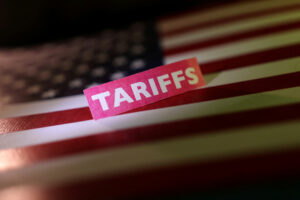




January Economic Update: Growth slows, prices rise
 DOWNLOAD
DOWNLOAD

Inflation Update: Up, up, and away?
 DOWNLOAD
DOWNLOAD

Quarterly Economic Growth Release: Growth takes on a slower pace
 DOWNLOAD
DOWNLOAD


Philippines unlikely to benefit from shifting trade routes

Shifting trade routes amid tit-for-tat tariffs would likely occur within Southeast Asia, Oxford Economics said, though this may not necessarily benefit the Philippines due to its poor logistics sector.
“The Philippines and Malaysia might also be able to capture some of the diverted trade flows looking to avoid ports with higher tariffs. They have the next two lowest tariff rates in the region, which are also below the global average of 27%,” it said at a research briefing.
“That said, the Philippines will probably not gain much from re-routing given its less developed trade logistics sector.”
In early April, US President Donald J. Trump announced higher reciprocal tariffs on most of its trading partners.
Southeast Asia was hit with some of the highest duties, though the Philippines was slapped with a 17% tariff, the second lowest in the region, just after Singapore.
However, Mr. Trump suspended the reciprocal tariffs for 90 days starting April 9 but implemented the 10% baseline tariff for all. The suspension would be lifted in July.
Oxford Economics said that the Association of Southeast Asian Nations (ASEAN) will likely undergo a “reordering of shipping routes” within the region.
“The ‘Liberation Day’ tariffs announced by US President Trump have been postponed. But they will have significant consequences for ASEAN if they are eventually implemented.”
“Given the extreme uncertainty, high fixed-asset investment costs, and the region’s strong labor cost advantages, we doubt ASEAN supply chains can adjust quickly,” it added.
Some businesses could opt to soften the impact of the higher tariffs by shifting production to locations slapped with lower tariffs.
“But not all businesses have diversified production bases and relocation costs are enormous. Also damaging is the hit from extreme trade policy uncertainty, which will lower business investment even if tariff hikes are eventually reduced or scrapped.”
“Lower-tariffed economies with transshipment capabilities could benefit. That said, a key risk is the potential for disruption to supply chains. A supply glut may arise as orders are canceled, while transportation capacity could also be strained.”
In the region, countries with the higher tariffs include Cambodia, Laos, Myanmar and Vietnam. Meanwhile, those that are “moderately exposed” to the US are Malaysia and Thailand.
“The relatively larger size of domestic spending in the Philippines buffers its economy against external volatility from an almost 20% export exposure to the US,” it added.
In 2024, the US was the top destination for Philippine exports, accounting for 17% of the total.
“Tariff rate differential considerations are key to production decisions. Companies with facilities in different economies could tap existing and available capacity in lower-tariff economies to fulfill production orders.”
However, the global economic advisory firm noted that not all companies have diversified production bases.
“Relocating or setting up new facilities typically involves significant fixed investment, even to lower-tariffed economies. The time needed to set up in new locations could stretch over several years, especially in sectors that require more complex facilities.”
Oxford Economics said the region’s “comparative advantage in the production of these goods should persist even with higher tariff rates.”
“This is particularly the case for lower value-added, labor-intensive manufacturing processes, such as the assembly of electricals or cut-and-trim processes for textiles, which some ASEAN economies dominate.”
“Given the labor-intensive nature of these processes, the large wage differential between the US and ASEAN economies is a core driver of the region’s competitive edge.”
In the medium term, Oxford Economics said it is unlikely that companies in ASEAN will reshore to the United States.
“Labor costs in the US are prohibitively high for the labor-intensive processes dominant in ASEAN. The region also benefits from economies of scales as an existing production hub.”
To cushion the impact of tariff hikes, ASEAN economies could consider lowering trade barriers on US goods.
“However, given the already low effective tariff on US goods relative to those imposed by the US, it’s unclear by how much these reciprocal tariffs will be lowered.”
ASEAN countries can also seek to ramp up US imports, it said.
“This was a method employed by China when Trump raised tariffs during his first term. However, it’s unlikely ASEAN will manage to do so in a manner that significantly reduces the US trade deficit.”
“The ASEAN consumer market is far smaller than that of the US given the sheer difference in income. This is also why we think the removal of what the US administration considers to be non-trade barriers isn’t likely to change much.”
Economies in the region can also invest more in the United States, it added.
“This approach is taken by Northeast Asian economies like South Korea. and Japan. But it’s probably not viable for ASEAN since most producers are foreign owned.” — Luisa Maria Jacinta C. Jocson
This article originally appeared on bworldonline.com





 By BusinessWorld
By BusinessWorld